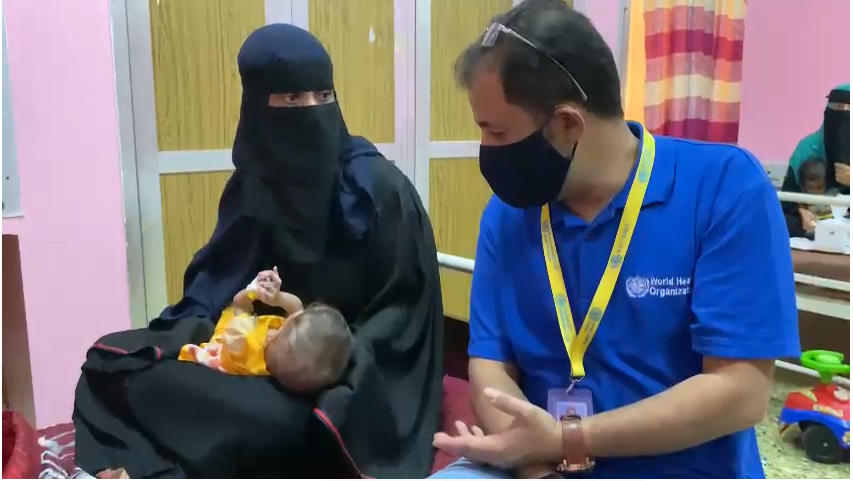
27 May 2021 – The conflict, economic decline and a poor health environment have been some of the drivers of acute malnutrition in Yemen. The number of children suffering has not decreased. In comparison to 16% in 2020, acute malnutrition and severe acute malnutrition among children under 5 reached 22% in 2021. This has been the highest rate of severe acute malnutrition recorded in Yemen since the escalation of the conflict in 2015.
Rozan is 10 months old from Lahj. Her mother brought her to the therapuetic feeding centre in WHO-supported Ibn Khaldoon hospital suffering from malnutrition and weighing as little as 3.9 kg. A healthy child her age should weigh at least 8 kgs. “She was frail and weak. She has been receiving treatment in this centre for 3 days now. She is feeling better; I can see the progress.” Her mother says happily.
“The support we receive here is very helpful. The treatment and meals are covered for free and we are well taken care of. Thank you for that,” adds Rozan’s mother.
Rozan is one of thousands of children who have been acquainted with suffering too early in life. Many of these children are likely to die if urgent care is not made available for them.
Child malnutrition challenges the physical and mental development of children, especially during the first 2 years of their lives. While Yemen is faced with looming famine, and widespread malnutrition, the future of an entire generation is at risk.
Ashwaq works at Ibn Khaldoon feeding centre. She attends to malnourished children every day. “Children suffering from malnutrition are continuously coming into this center to seek treatment. Many families who were forced into displacement and vulnerable families would have nowhere else to go if centres like this one did not have their doors open,” says Ashwaq.
“This centre ensures the provision of treatment, medicines and meals for malnourished children coming from the most vulnerable communities,” she adds.
WHO and KSrelief sustaining essential nutrition services in Yemen
WHO and the King Salman Humanitarian Aid and Relief Centre (KSrelief) have been sustaining the capacity of the therapeutic feeding centres across the country to ensure delivery of essential health services are maintained free of charge for populations affected by the humanitarian crisis. Today, 90 operational centres across Yemen are providing health services for people in need (82% of total centres in the country).
The support WHO and KSrelief deliver includes rehabilitation of targeted centres, equipping them with essential medical, laboratory and water, sanitation and hygiene supplies. In addition to supporting health personnel with incentive payments and capacity-building. As well as supporting families accompanying their children with admission kits and counselling. From September 2020 to March 2021, 12 873 children under the age of 5 have been treated and 12 873 caregivers benefited from counselling. During this period, 1300 health workers in the designated centres have been supported with on-the-job training to strengthen quality service delivery in the context of COVID-19.


